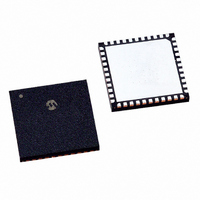PIC16F877A-I/ML Microchip Technology, PIC16F877A-I/ML Datasheet - Page 66

PIC16F877A-I/ML
Manufacturer Part Number
PIC16F877A-I/ML
Description
IC MCU FLASH 8KX14 A/D 44QFN
Manufacturer
Microchip Technology
Series
PIC® 16Fr
Datasheets
1.PIC16F616T-ISL.pdf
(8 pages)
2.PIC16F688T-ISL.pdf
(688 pages)
3.PIC16C770-ISO.pdf
(8 pages)
4.PIC16F873A-ISO.pdf
(234 pages)
5.PIC16F873A-ISO.pdf
(6 pages)
6.PIC16F873A-ISO.pdf
(4 pages)
7.PIC16F873A-ISO.pdf
(6 pages)
8.PIC16F873A-ISO.pdf
(4 pages)
9.PIC16F873A-ISO.pdf
(22 pages)
Specifications of PIC16F877A-I/ML
Core Size
8-Bit
Program Memory Size
14KB (8K x 14)
Core Processor
PIC
Speed
20MHz
Connectivity
I²C, SPI, UART/USART
Peripherals
Brown-out Detect/Reset, POR, PWM, WDT
Number Of I /o
33
Program Memory Type
FLASH
Eeprom Size
256 x 8
Ram Size
368 x 8
Voltage - Supply (vcc/vdd)
4 V ~ 5.5 V
Data Converters
A/D 8x10b
Oscillator Type
External
Operating Temperature
-40°C ~ 85°C
Package / Case
44-QFN
Controller Family/series
PIC16F
No. Of I/o's
33
Eeprom Memory Size
256Byte
Ram Memory Size
368Byte
Cpu Speed
20MHz
No. Of Timers
3
Processor Series
PIC16F
Core
PIC
Data Bus Width
8 bit
Data Ram Size
368 B
Interface Type
I2C, SPI, USART
Maximum Clock Frequency
20 MHz
Number Of Programmable I/os
33
Number Of Timers
1 x 16 bit
Operating Supply Voltage
2 V to 5.5 V
Maximum Operating Temperature
+ 85 C
Mounting Style
SMD/SMT
3rd Party Development Tools
52715-96, 52716-328, 52717-734
Development Tools By Supplier
PG164130, DV164035, DV244005, DV164005, PG164120, ICE2000, DM163022, DV164120
Minimum Operating Temperature
- 40 C
On-chip Adc
8
Lead Free Status / RoHS Status
Lead free / RoHS Compliant
For Use With
XLT44QFN2 - SOCKET TRAN ICE 44QFN/40DIPAC164322 - MODULE SOCKET MPLAB PM3 28/44QFN444-1001 - DEMO BOARD FOR PICMICRO MCU
Lead Free Status / Rohs Status
Details
Available stocks
Company
Part Number
Manufacturer
Quantity
Price
Company:
Part Number:
PIC16F877A-I/ML
Manufacturer:
TE
Quantity:
1 000
Part Number:
PIC16F877A-I/ML
Manufacturer:
MICROCHIP/微芯
Quantity:
20 000
- PIC16F616T-ISL PDF datasheet
- PIC16F688T-ISL PDF datasheet #2
- PIC16C770-ISO PDF datasheet #3
- PIC16F873A-ISO PDF datasheet #4
- PIC16F873A-ISO PDF datasheet #5
- PIC16F873A-ISO PDF datasheet #6
- PIC16F873A-ISO PDF datasheet #7
- PIC16F873A-ISO PDF datasheet #8
- PIC16F873A-ISO PDF datasheet #9
- Current page: 66 of 688
- Download datasheet (3Mb)
PICmicro MID-RANGE MCU FAMILY
3.4
DS31003A-page 3-16
Design Tips
Question 1:
Answer 1:
If the device you are using does not have filtering to the on-chip master clear circuit
ensure that proper external filtering is placed on the MCLR pin to remove narrow pulses. Electri-
cal Specification
Question 2:
Answer 2:
The most common reason for this is that the windowed device (JW) has not had its window cov-
ered. The background light causes the device to power-up in a different state than would typically
be seen in a device where no light is present. In most cases all the General Purpose RAM and
Special Function Registers were not initialized properly.
When my system is subjected to an environment with ESD and EMI, it oper-
ates erratically.
With JW (windowed) devices my system resets and operates properly. With
an OTP device, my system does not operate properly.
parameter 35
specifies the pulse width required to cause a reset.
1997 Microchip Technology Inc.
(Appendix
C),
Related parts for PIC16F877A-I/ML
Image
Part Number
Description
Manufacturer
Datasheet
Request
R

Part Number:
Description:
Manufacturer:
Microchip Technology Inc.
Datasheet:

Part Number:
Description:
IC MCU FLASH 8KX14 EE 40DIP
Manufacturer:
Microchip Technology
Datasheet:

Part Number:
Description:
IC MCU FLASH 8KX14 EE 40DIP
Manufacturer:
Microchip Technology
Datasheet:

Part Number:
Description:
IC MCU FLASH 8KX14 EE 40DIP
Manufacturer:
Microchip Technology
Datasheet:

Part Number:
Description:
IC MCU FLASH 8KX14 EE 40DIP
Manufacturer:
Microchip Technology
Datasheet:

Part Number:
Description:
IC MCU FLASH 8KX14 EE 44PLCC
Manufacturer:
Microchip Technology
Datasheet:

Part Number:
Description:
IC MCU FLASH 8KX14 EE 44TQFP
Manufacturer:
Microchip Technology
Datasheet:

Part Number:
Description:
IC MCU FLASH 8KX14 EE 44TQFP
Manufacturer:
Microchip Technology
Datasheet:

Part Number:
Description:
IC MCU FLASH 8KX14 EE 44TQFP
Manufacturer:
Microchip Technology
Datasheet:

Part Number:
Description:
IC MCU FLASH 8KX14 EE 44PLCC
Manufacturer:
Microchip Technology
Datasheet:

Part Number:
Description:
IC MCU FLASH 8KX14 EE 44TQFP
Manufacturer:
Microchip Technology
Datasheet:

Part Number:
Description:
IC MCU FLASH 8KX14 EE 44-MQFP
Manufacturer:
Microchip Technology
Datasheet:

Part Number:
Description:
IC MCU FLASH 8KX14 EE 44-MQFP
Manufacturer:
Microchip Technology
Datasheet:

Part Number:
Description:
IC MCU FLASH 8KX14 EE 44TQFP
Manufacturer:
Microchip Technology
Datasheet:











